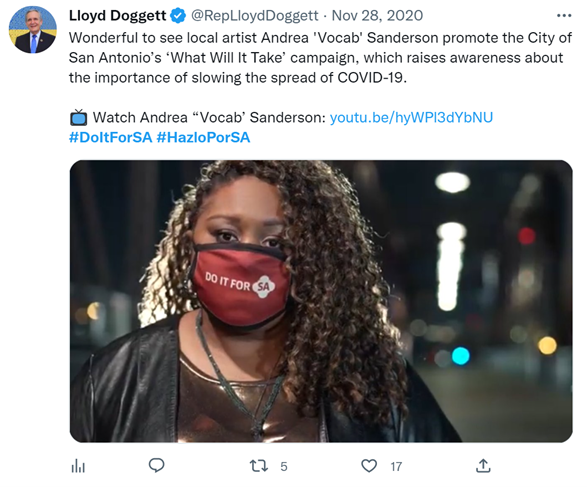This blog post was written by Charlotte Ciampa, Communications Intern for the Environmental Health team at NACCHO. Charlotte is a Senior Communications and Media Studies major with minors in Marketing and Global and Public Health at Emmanuel College in Boston, MA.
Social media has become a necessity of daily life, and this expands beyond personal use of these apps into the work of public health. These platforms which exist to connect people, share news, and disseminate information, can also prove extremely useful to local health departments (LHDs) and should be used to their full capabilities to promote community health.
The coronavirus (COVID-19) pandemic serves as a reminder of the negative and positive effects of social media during a public health crisis. Social media was both an incubator for misinformation that local health officials have had to combat as well as a strategic tool that health departments used to inform the behavioral health of the public during the pandemic. This example is worth examining in detail to understand how best to navigate social media ahead of the next public health crises as well as how it can be best utilized generally by LHDs.
Misinformation on Social Media
One of the most blaring negative impacts of social media during the COVID-19 pandemic would be the ease at which misinformation can spread through these applications. On social media platforms, users may create personal, unfiltered posts that are free from the responsibility of fact-checking. There are also numerous bots and trolls on these apps which exist solely to generate and spread misinformation surrounding health topics. Due to these two factors, the wave of misinformation on social media is unlike any that health departments may have encountered in the days before social media.
Some of the most rampant misinformation being spread on social media during the time of the pandemic was false information surrounding vaccines. The Kaiser Family Foundation COVID Vaccine Monitor found that 78% of adults claimed they have heard at least one of eight different false statements about COVID-19 that they believed to be true or are unsure whether or not it is true or false, showcasing the enormity of misinformation that was spread by social media and news outlets alike.
However, misinformation surrounding vaccines is not unique to COVID-19. Measles, Mumps, and Rubella (popularly known as MMR) vaccine hesitancy stemmed majorly from a proposed correlation between the vaccine and autism; the Zika virus vaccine was depicted as a bioweapon to depopulate the Earth; and the Ebola outbreak saw a similar response.
The spread of misinformation not only affects vaccine hesitancy but can also have direct health behavior consequences. As detailed in the Clinical Infectious Diseases Journal, the misinformation on social media can also “[lead] to hospitalizations due to self-medication with inappropriate and potentially toxic regimens, such as ivermectin intended for livestock, along with global panic-buying due to rumors of complete shutdown.”
Social media provides a streamlined route of not only spreading misinformation but also exposing mass amounts of people to misinformation online without the means to fact-check the information they are exposed to, which in the context of a public health emergency, can exacerbate the situation.
Strategies on Building Trust Through Social Media and Beyond: Success Stories During COVID-19

A screenshot of the Twitter campaign from the California Department of Public Health.
While misinformation is certainly rampant on social media, these platforms also provide a space for state and local health departments to promote safe health habits and combat misinformation. Below are some strategies that worked for state and local level departments.
Making Informed Decisions in Their Own Time: The California Department of Public Health/Women, Infants and Children Division developed social media toolkits to help combat misinformation online and decrease vaccine hesitancy in their state. This COVID-19 Vaccine Awareness Social Media Toolkit addressed concerns surrounding pregnancy and the vaccine, encouraged those who were hesitant to ask questions, and linked to additional resources which give their community the space to do their own research and feel comfortable with the decision to get vaccinated.

A screenshot of the “What Will It Take?” Campaign on Twitter. (Credit: San Antonio Metropolitan Health District)
Creative Partnerships: On a more local level, local health departments such as the San Antonio Metropolitan Health District released easy-to-use social media toolkits to help spread useful information about COVID-19 and the vaccine throughout their community. These toolkits were a part of their “What Will it Take?” campaign targeted towards reducing vaccine hesitancy within the San Antonio Metropolitan area. The other part of this campaign entailed partnerships with local artists to create music videos centered around COVID-19 and vaccinations, all available online and shared on social media. “What Will it Take?” was awarded the Gold 2022 NACCHO Innovative Practice Award to honor the innovation and success of this campaign.

More from the “What Will It Take?” Campaign. (Credit: San Antonio Metropolitan Health District)
NACCHO has heard from many local health members regarding the lack of trust in public health information disseminated from trusted sources during the pandemic. As our local health members put it in a recent publication, “An acute focus on rebuilding public understanding and trust will be necessary if we hope to strengthen the public health infrastructure in the U.S. after the COVID-19 pandemic.” Below are some ways we recorded local health staff addressing the issue in the field of environmental health.
Sustained Stakeholder Engagement: Public trust may be cemented only with reliable and transparent information exchange. Federal, state, and local level stakeholders can benefit from regularly exchanging information through stakeholder meetings to ensure this goal is met. North Carolina’s COVID-19 response in childcare settings demonstrated this need. According to David Brown, MPA, Surveillance Coordinator for the Children’s Environmental Health Unit (CEHU) at the North Carolina Department of Health and Human Services, “Where information was uncertain or not available, state health officials indicated that current guidance was based on the best available information but subject to change as more information became available.” Sustaining this stakeholder relationship beyond a crisis can help with ensuring messaging always remains accurate and reliable to both local health and the community they serve.
Enlisting Champions and Trusted Leaders Within Impacted Communities: Community-based organizations, verified small business owners, and trusted leaders of the community such as religious heads can help spread the message to boost campaign efforts tenfold while helping instill trust in the source of the information – public health. For instance, the U.S. Virgin Islands (USVI) Department of Public Health successfully disseminated messaging about local mosquito control in homes and businesses using traditional flyers and educational slides with the help of trusted leaders and institutions in the community to reach all ages (e.g., sessions at local schools and churches).
Thinking Outside of Social Media: While social media proved an effective tool to reach most people during the peak of the COVID-19 “stay-at-home” months, other platforms such as television and radio were also widely popular as sources of entertainment. The USVI mosquito surveillance and control campaign, for instance, researched their community’s viewership on other entertainment stations and consequently targeted their communications via ads placed on popular radio channels and local television stations during COVID-19, enabling a wider swathe of the population to become aware of mosquito control solutions at home and who to contact at their local public health department if they had questions.
We also recommend reading up on baseline recommendations to combat misinformation on social media through this Journal of Public Health Management and Practice article.






